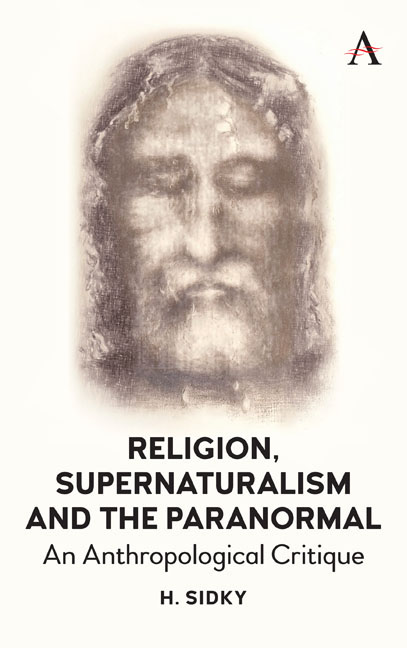Book contents
- Frontmatter
- Dedication
- Contents
- Acknowledgments
- Introduction
- Chapter One The Problem with Religion: Preliminary Issues
- Chapter Two The Unreal Real: The Supernatural, Religion, and the Paranormal
- Chapter Three Can Science Say Anything About Religion and the Supernatural?
- Chapter Four Ghostly Rappings, the Science of the Soul, and the Religious Nature of the Paranormal
- Chapter Five Ghostly Encounters in the Field: Anthropology of the Paranormal or Paranormal Anthropology?
- Chapter Six Why We Think the World Is Haunted
- Chapter Seven Cognitive Biases and Why People Think Eerie Thoughts
- Chapter Eight Miracles as Evidence of God's Actions in the World
- Chapter Nine When God Talks to People: Are Religious Experience Evidence of God?
- Chapter Ten Books Authored by God? Sacred Texts as Evidence of the Supernatural
- Chapter Eleven God's Fingerprints in the Natural World: Intelligent Design, Irreducible Complexity, and Cosmic Fine-Tuning
- Chapter Twelve The Miracles of the Bible: The Quintessential Foundations of Paranormal Beliefs in Western Culture
- Chapter Thirteen Jesus the Miracle Worker, Magician, and Sorcerer
- Chapter Fourteen Jesus's Empty Tomb, Missing Body, and Return from The Dead: Sources for the Paranormal Tale
- Chapter Fifteen The Post-Resurrection Appearances in the New Testament
- Chapter Sixteen Coping with Failed Prophesy: A Socio-Psychological Explanation for the Rise of Christianity
- Chapter Seventeen Conclusions: Why Religious and Paranormal Beliefs Persist and Their Dangers
- References
- Index
Chapter Ten - Books Authored by God? Sacred Texts as Evidence of the Supernatural
Published online by Cambridge University Press: 16 December 2019
- Frontmatter
- Dedication
- Contents
- Acknowledgments
- Introduction
- Chapter One The Problem with Religion: Preliminary Issues
- Chapter Two The Unreal Real: The Supernatural, Religion, and the Paranormal
- Chapter Three Can Science Say Anything About Religion and the Supernatural?
- Chapter Four Ghostly Rappings, the Science of the Soul, and the Religious Nature of the Paranormal
- Chapter Five Ghostly Encounters in the Field: Anthropology of the Paranormal or Paranormal Anthropology?
- Chapter Six Why We Think the World Is Haunted
- Chapter Seven Cognitive Biases and Why People Think Eerie Thoughts
- Chapter Eight Miracles as Evidence of God's Actions in the World
- Chapter Nine When God Talks to People: Are Religious Experience Evidence of God?
- Chapter Ten Books Authored by God? Sacred Texts as Evidence of the Supernatural
- Chapter Eleven God's Fingerprints in the Natural World: Intelligent Design, Irreducible Complexity, and Cosmic Fine-Tuning
- Chapter Twelve The Miracles of the Bible: The Quintessential Foundations of Paranormal Beliefs in Western Culture
- Chapter Thirteen Jesus the Miracle Worker, Magician, and Sorcerer
- Chapter Fourteen Jesus's Empty Tomb, Missing Body, and Return from The Dead: Sources for the Paranormal Tale
- Chapter Fifteen The Post-Resurrection Appearances in the New Testament
- Chapter Sixteen Coping with Failed Prophesy: A Socio-Psychological Explanation for the Rise of Christianity
- Chapter Seventeen Conclusions: Why Religious and Paranormal Beliefs Persist and Their Dangers
- References
- Index
Summary
Here then we are first to consider a book, presented to us by a barbarous and ignorant people, written in an age when they were still more barbarous, and in all probability long after the facts which it relates, corroborated by no concurring testimony, and resembling those fabulous accounts, which every nation gives of its origin.
— David Hume, Enquiries Concerning the Human Understanding (1748)A book that really came from the all-powerful, all-knowing, perfect creator of the universe would be unimaginably brilliant. […] Each point made each idea expressed would be inarguable and stunning. […] It would blow us away. It would be impossible to put down. It would touch each of us personally, regardless of our ages, our education, or our experiences.
— Marshall Brain, How “God” Works (2014)All that is necessary, as it seems to me, to convince any reasonable person that the Bible is simply and purely of human invention— of barbarian invention— is to read it.
— Robert Ingersoll, Lectures of Col. R. G. Ingersoll (1907)The three major world religions, Judaism, Christianity, and Islam, possess revealed texts, the Old Testament, The New Testament, and the Qur'an. These are the purported written records of God's communication to humans by way of a selected emissary, messiah, prophet, vatic, and so forth. While humans are involved in the transmission process, the ultimate author of these books is claimed to be none other than God himself.
These mighty tomes are the basis of the theological “argument from Scripture” for the existence of God. Given that this is part of the arsenal theists and religious apologists employ in their invectives against naturalism and science, claims about the miraculous nature, inerrancy, and supernatural origins of these books are legitimate issues for scrutiny according to the tradition of systematic skepticism in science.
Proposed Evidence of the Divine Origins of Sacred Texts
How do we know that these books are of divine origins? First, the very fact that such texts exist becomes proof for the reality of their supernatural author. In other words, if God does not exist, then how can the existence of the holy book be explained? What this involves, of course, is the question-begging assertion that God wrote the book; therefore, the book is evidence that God exists.
- Type
- Chapter
- Information
- Religion, Supernaturalism, the Paranormal and PseudoscienceAn Anthropological Critique, pp. 239 - 258Publisher: Anthem PressPrint publication year: 2019

